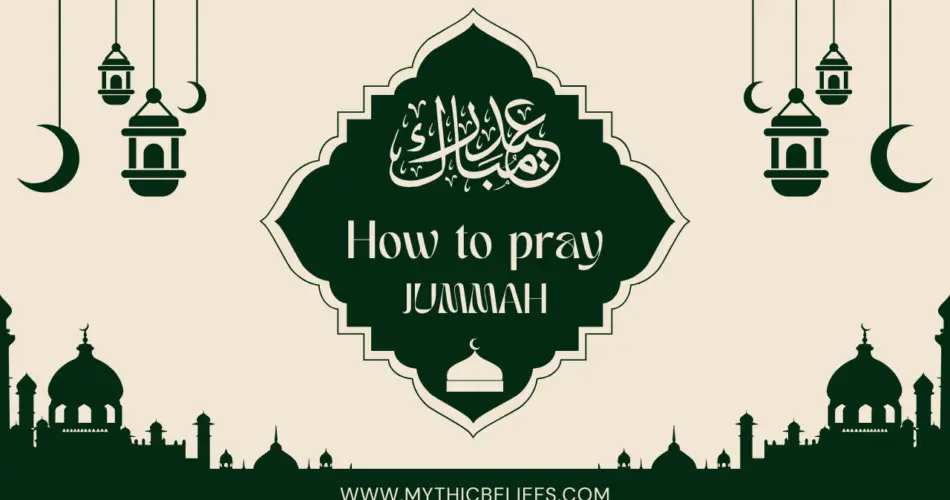Friday isn’t just another day in the week—it’s a day of blessings, community, and a moment to pause from the hustle of life to reconnect with Allah. Jummah (Friday) prayer is a special congregational prayer that carries extra significance in Islam. If you’ve ever wondered how to pray Jummah properly, whether at the mosque or at home, you’re in the right place. Let’s break it down in a simple, relatable way. Grab a cup of chai, and let’s dive in.
How to Pray Jummah Namaz Step by Step?
Praying Jummah isn’t all that different from your regular Dhuhr prayer, but there are a few key distinctions. It’s held in congregation, and there’s a sermon (Khutbah) before the actual prayer. Here’s how it goes:
- Arrive Early at the Mosque: Ideally, you should aim to get there before the Khutbah starts. It’s a great time to recite some Quran, make dua, and soak in the spiritual atmosphere. Plus, finding a good spot in the mosque is always a win.
- Listen to the Khutbah (Sermon): The Imam delivers a sermon in two parts, usually addressing important religious, social, or moral topics. Stay seated, listen attentively, and avoid distractions—yes, that means putting your phone on silent.
- Pray the Two Rakat Fardh: Once the Khutbah is over, the congregation stands for the main Jummah prayer. It consists of two rakats (units of prayer) led by the Imam. Just follow along with the Imam, just like in any other congregational prayer.
- Complete Your Sunnah and Nafl Prayers: After the main prayer, it’s recommended to offer additional prayers:
- Four Rakats Sunnah Mu’akkadah (before the Khutbah) – If you arrive early, you can pray these.
- Four Rakats Sunnah Mu’akkadah (after the Fardh prayer).
- Two Rakats Sunnah Mu’akkadah (some scholars say it’s optional but highly recommended).
- Two Rakats Nafl (optional but rewarding).
And just like that, you’re done! Simple, right?
How Many Rakats Are There in Jummah Prayer?
If you’ve ever been confused about how many rakats to pray, don’t worry—you’re not alone. Here’s a quick breakdown:
- Before the Khutbah: 4 Sunnah Mu’akkadah (highly recommended but not obligatory)
- Main Jummah Prayer: 2 Fardh (led by the Imam, obligatory)
- After the Fardh prayer: 4 Sunnah Mu’akkadah + 2 Sunnah Mu’akkadah + 2 Nafl (optional but beneficial)
Total? 14 Rakats if you pray everything. But at the very least, the 2 Fardh rakats are a must.
What is the Structure of the Jummah Prayer?
Unlike daily prayers, Jummah has a structured format that includes a sermon before the main prayer. Here’s a breakdown:
- First Call to Prayer (Adhan): This signals that Jummah is about to begin.
- Khutbah (Sermon): The Imam delivers the sermon in two parts. It’s in Arabic, but many mosques provide translations or summaries.
- Second Call to Prayer: Announcing that the prayer is about to start.
- Two Rakat Fardh Prayer: The congregation prays behind the Imam.
- Additional Sunnah/Nafl Prayers: As discussed earlier, these follow the main prayer.
How to Pray Jummah for Ladies?
For women, Jummah prayer is not obligatory but highly recommended. Many mosques now have designated prayer spaces for women, making it easier for them to attend. However, if you’re at home, you can simply pray Dhuhr (four rakats Fardh) instead of Jummah.
Some scholars say women can pray Jummah at home if they follow the full structure, including listening to a recorded Khutbah. But if you’re unsure, the safest option is to pray Dhuhr as usual.
The Significance of Jummah in 2025
In today’s fast-paced world, where everyone’s glued to their screens and constantly juggling work, family, and responsibilities, Jummah prayer serves as a spiritual reset. It’s that one hour in the week where you unplug from the chaos and realign your heart with what truly matters.
With the rise of virtual khutbahs and live-streamed sermons, many Muslims are now tuning in even when they can’t make it to the mosque. While technology is bridging gaps, nothing replaces the experience of praying shoulder to shoulder with your fellow believers. If you can, make it to the mosque—it’s worth it.
Final Thoughts
Jummah prayer isn’t just about obligation; it’s about community, reflection, and spiritual rejuvenation. Whether you’re a seasoned pro or someone trying to get back into the habit, just remember—it’s not about perfection, it’s about intention and effort.
Got any Jummah traditions or experiences you’d love to share? Drop them in the comments below! Let’s keep the conversation going.
May your Friday be blessed, and may your duas be accepted!
